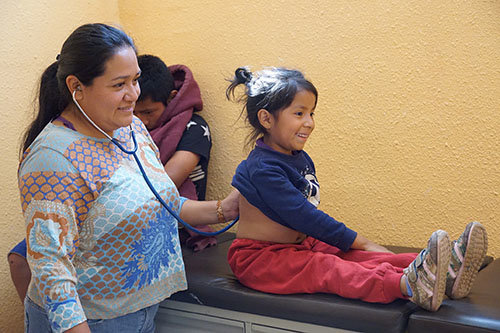BRUNSWICK — Most people in America have medicine, health care, and health care professionals available to them on a regular basis. Hospitals and medical clinics dot the landscape from Boston to San Diego and from Duluth, MN to Brownsville, TX. Many drug stores and pharmacies have 24-hour-service to provide prescription and over-the-counter drugs to those who need medication to combat colds, fevers, aches, pain, and a variety of ailments.
While citizens of this great nation are tempted to take such medical benefits for granted there are millions in the world who are bereft of any such advantage. In fact, Global Issues provides some very sobering facts about the health challenges that exist around the world.
 Fiver-year-old Charon smiles during a medical checkup for respiratory issues at the Guatemala City Dump School and Clinic in Guatemala. Respiratory illnesses for those who live near the dump, such as Charon and her mother and siblings, are commonplace for those receiving aid from MAP. MAP/Special
Fiver-year-old Charon smiles during a medical checkup for respiratory issues at the Guatemala City Dump School and Clinic in Guatemala. Respiratory illnesses for those who live near the dump, such as Charon and her mother and siblings, are commonplace for those receiving aid from MAP. MAP/SpecialAnup Shah, writing for Global Issues, reports, “One billion people lack access to health care systems. Each year more than 7.5 million children (under the age of five) die from malnutrition and mostly preventable diseases. In a recent year 6.7 million people died of infectious diseases alone, far more than the number killed in the natural or man-made catastrophes that make headlines.
“Tuberculosis kills 1.7 million people each year, with 9.4 million new cases reported each year. Hundreds of thousands of children have died from measles in the last few years even though effective immunization costs less than $1.00 and have been available for more than 40 years.”
Global Issues and the World Health Organization have additional statistics that illustrate the tremendous need for health care, particularly in the underdeveloped countries around the world.
Medical Assistance Programs (MAP) international is a global Christian health and relief organization in Georgia ready to partner with churches to meet the spiritual and medical needs of the underprivileged people around the world. Their objective is to reach out to people living in conditions of poverty to save lives and develop healthier families and communities.
The service organization’s mission is to advance the total health of people living in the world’s poorest communities. They carry out that mission through disease prevention, relief, and community health development.
According to the organization’s website, “In 1954, the late J. Raymond Knighton answered a call in his tiny office at the Christian Medical Society in Chicago. Ray had a reputation for knowing ‘every medical missionary in the world,'” so when a major pharmaceutical company wanted to donate $25,000 in surplus medicines, they knew just who to call.
“Ray and his secretary spent three months distributing 11 tons of medicines where they were needed most. So began the Medical Assistance Programs – a faith based nonprofit providing essential medicines for mission clinics and hospital in developing countries around the world.
“In 1985, MAP moved from the Chicago area to Georgia’s Atlantic coast to position itself closer to the ports of Savannah, Brunswick, and Jacksonville. In 2008, MAP moved into a new energy efficient facility to expand its distribution capabilities to reach those in most need.
“Since 1954 MAP has delivered over $5 billion in medicines and medical supplies to partners, mission hospitals, clinics, and medical mission teams.
Craig Hartzog, pastor of Northside Baptist Church in Brunswick informed The Index about the ministry of MAP International. He explained, “Pharmaceutical companies donate the drugs to MAP International and they in turn have partner agencies (many are Christian) around the world. Anyone can receive medical supplies from them, therefore any of our medical teams going overseas could request items such as antibiotics, sutures, Advil, Tylenol, and many other drugs.”
Katie Pace, who works with MAP International, commented, “Our short-term Medical Mission Pack Program of pre-packed medicines are especially made for missionaries to travel to third world countries, so these partners are primarily churches.”
Pace continued, “We also have a long-term health development program that provides container shipments of medicines and medical supplies year round to medical organizations and field partners. We also have offices in Uganda, Kenya, Cote d’ Ivoire, Liberia, Ghana, Bolivia, Ecuador, and Indonesia where we focus on community health development, clean water, neglected tropical diseases and maternal and child health projects.”
MAP International has been recognized for their 99 percent efficiency rating. Every $1 donated to MAP International provides $60 in vital medicines and medical supplies to children and families in need in over 100 countries, treating 10 million people each year.
If your church takes short-term mission trips to underdeveloped countries with a medical missions component you may want to avail yourselves of the provisions MAP International can contribute to your missions’ effort.
Pace added, “Even though we are a 60-year-old organization that has been based in Georgia for over 30 years, people are unaware that we are here. We provide over $400 billion each year in medical aid to those in most need around the world, but we can’t do this without our partners and medical mission teams.
“We want mission teams to understand that taking medicines with them if they have a physician or even over-the-counter products without a physician can make a huge impact in the developing world. It’s an impact that they can leave behind after their trip is over.
“We want to encourage every medical team in Georgia to take our Mission Packs with them and have a lasting impact on the communities they serve. And of course, donations always help us further our mission as well! Let us know if there’s anything that we can do to strengthen every mission team sent out from Georgia.”